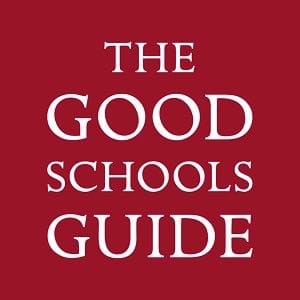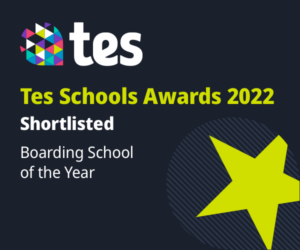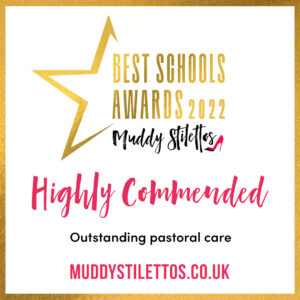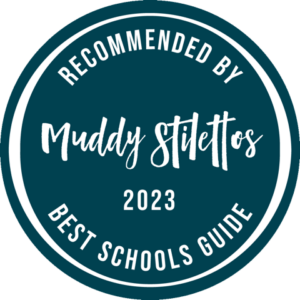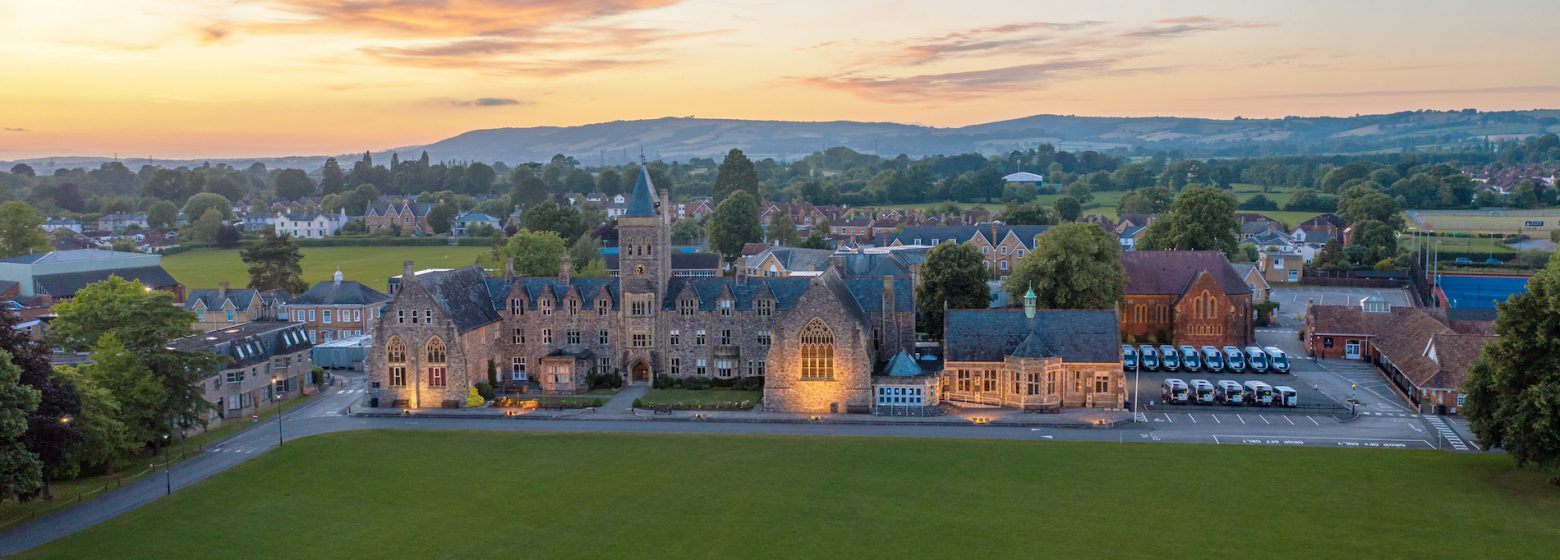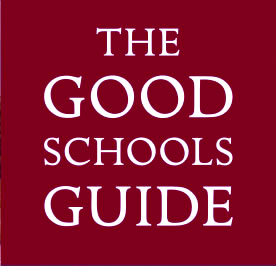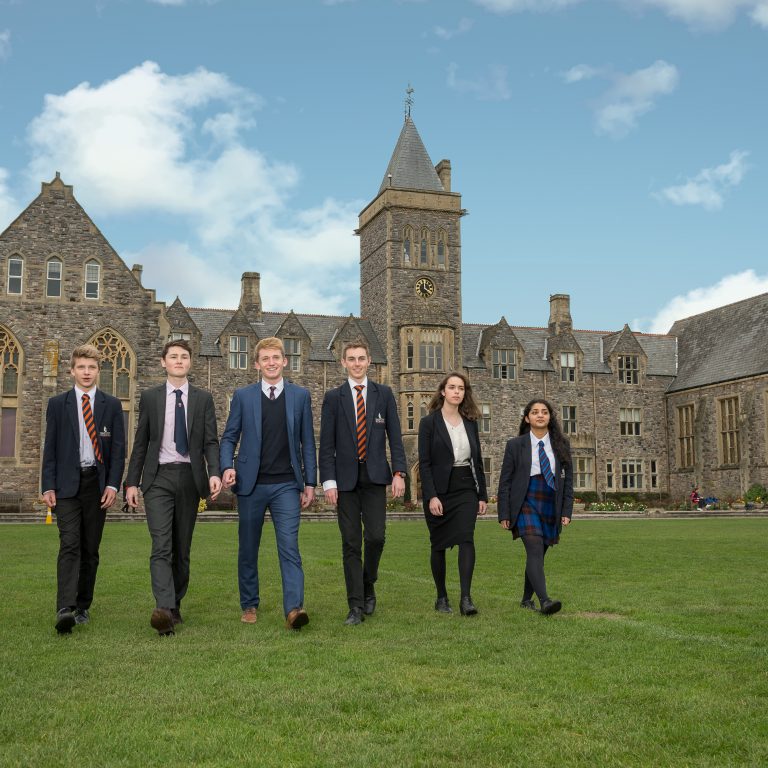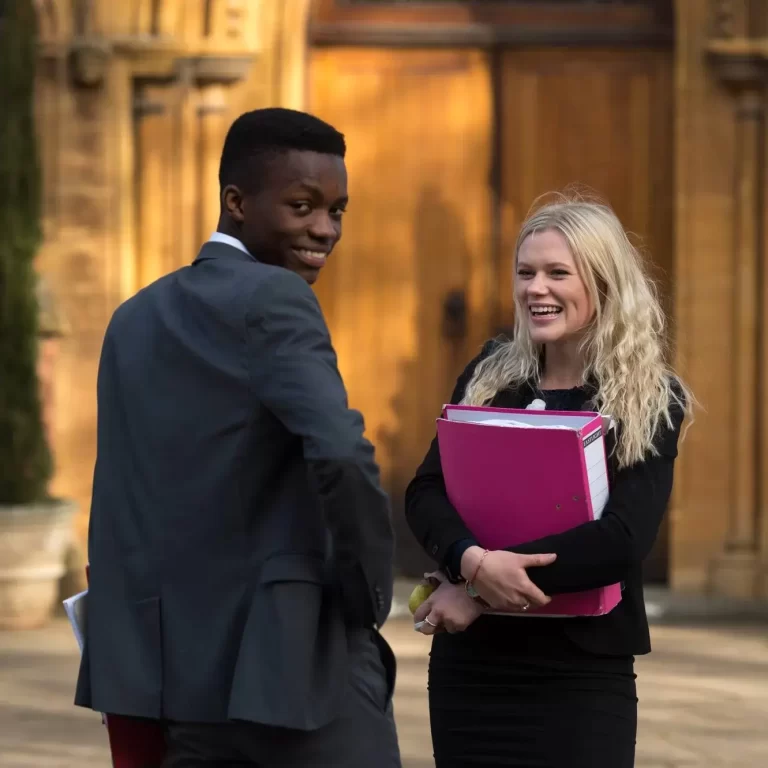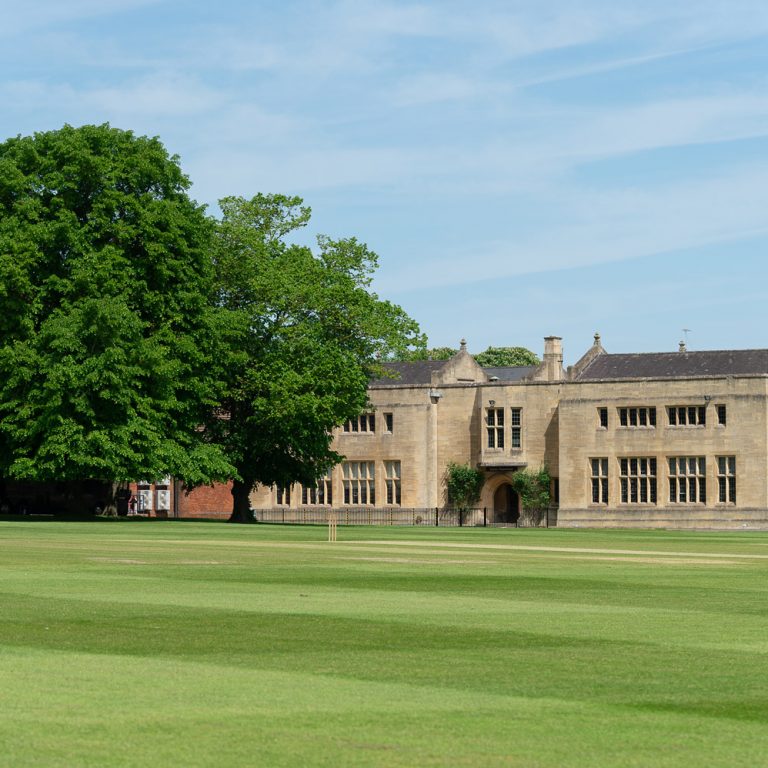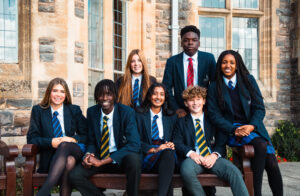What The Good Schools Guide says
Headmaster
Since September 2022, James Johnson, previously head of senior school at Ardingly College in West Sussex. Educated at Radley College, UCL, where he read English, and Trinity College Dublin, where he did an MPhil in Anglo-English literature. After a PGCE at the University of Cambridge, he spent three years at Cheltenham College, then taught English at Tonbridge, coaching the first XV rugby team, directing plays and becoming a housemaster along the way. He spent six years at Ardingly, first as senior deputy head and then as head of senior school.
He’s ‘a bit allergic’ to being asked to distil Taunton’s USP into a snappy catchphrase but tells parents that the school ‘will look after your child, fulfil their academic potential and give them a host of co-curricular opportunities’. He’s proud of the fact that the school is genuinely pioneering and forward-thinking. In 1974 it was one of the first single-sex independent schools to go co-ed (it’s currently 55 per cent boys, 45 per cent girls) and in 1996 became the first to open an international school on its site.
He doesn’t teach at the moment – he was only a few weeks into his role at the time of our visit – but hopes to in the future. He’s already made a positive impression on the pupils. ‘They rate him really highly,’ a parent told us. ’My children are in the sixth form and they say he’s approachable, really easy to talk to and really kind. He’s the right head with the right skillset.’ Another described him as ‘engaged and dynamic’. A third mentioned a recent assembly where he spoke about the importance of ‘kindness, humility and engagement’. ‘The pupils have got these great opportunities and he wants them to grasp them with both hands,’ she added. The sixth formers we spoke to concurred. ‘We meet him once a week,’ said the head of student voice. ‘He’s very open to listening.’
Married to Rachel, a paediatric neuropsychologist at Great Ormond Street Hospital, with two children, both at the prep school. In his spare time he enjoys going to National Trust properties, exercise (‘it’s my non-thinking time’) and reads as much as he can. When we visited he’d just finished Sally Rooney’s Beautiful World, Where Are You and wasn’t convinced that her work would stand the test of time. Asked about his favourite books, he immediately recommended Underland: A Deep Time Journey by Robert Macfarlane and The Book of Strange New Things by Michel Faber. As an English teacher he can’t bear business jargon – particularly phrases like ‘blue sky thinking’, ‘granular’ and ‘deep dives’. ‘It brings me out in hives,’ he laughs. ‘I’m frustrated by arcane or oblique language that excludes others.’ His antipathy to business-speak was so well-known at Ardingly that colleagues jokingly presented him with a picture featuring his most loathed phrases when he left.
Entrance
No entrance exam – entrance is based on an interview (in person, where possible), report and reference. ‘You have to be academically competent and a student we can work with,’ says the deputy head academic. Years 9, 10 and 12 are the usual entrance points but it’s possible to join at other times if they’ve got room. Around 70 pupils join year 9 from the prep each year, plus 20 to 25 from state schools, preps and abroad. Waiting lists for several year groups at the moment. Fifty to 60 arrive in year 12, from local state schools, other independent schools and Taunton School International. Sixth form applicants need at least five grade 5s at GCSE (assessment tests for those not taking recognised exams).
Exit
A fifth leave after GCSE, some for the local sixth form college. At 18, pretty much all progress to university, half to the Russell Group. Popular destinations include Imperial, Cardiff, Exeter, Edinburgh, Queen Mary London, Lancaster, Reading and Durham. Most favoured courses currently are STEM, business and management and sports science. The school is a national SAT centre and some students head to the US, choosing places like Harvard and UCLA. A handful to study medicine, dentistry and veterinary science (two in 2022); sometimes a few to Oxbridge (none in 2022). Plenty of guidance for pupils opting for vocational training or apprenticeships too.
Latest results
In 2022, 43 per cent 9-7 at GCSE; 38 per cent A*/A at A level (66 per cent A*-B); 96 per cent distinction* or distinction in BTEC. Average IB point score of 34.3. In 2019 (the last pre-pandemic results), 43 per cent 9-7 at GCSE; 37 per cent A*/A at A level (67 per cent A*-B).
Teaching and learning
Taunton is one of the only schools in the country to offer four different pathways for sixth formers. Pupils at the senior school can choose from A levels, the IB and BTECs while on the north side of the campus Taunton School International (for 16 to 18-year-olds) runs a pre-foundation year. This gives international students who are interested in business and economics the chance to gain the skills and qualifications to move on to the NCUK international foundation year, which prepares them for business-related undergraduate degrees. As well as Taunton School International there’s also Taunton School International Middle School for 13 to 16-year-olds, which offers a pre-GCSE programme and one or two-year GCSE/pre-IB programmes.
Two-thirds of sixth formers do A levels (24 subjects to choose from), up to a quarter opt for the IB and others take BTECs in sport and exercise science and/or business. Some do the EPQ as well. Most A level combinations are possible – within reason and subject to timetable constraints. Maths is the most popular A level subject, followed by psychology, business and biology. Maximum class sizes of 24 in years 9 to 11, but likely to be fewer than that, especially in optional subjects like Latin and music. Most take nine GCSEs. French, German, Spanish and Italian offered, plus Russian and Chinese for native speakers. A third take triple science at GCSE, the rest do combined science. Setting in maths from year 9, although the school ‘avoids sink sets’ and doesn’t number them.
The school still has Saturday school – ‘it opens up the rest of the week,’ says the head, a firm believer in giving pupils time to pursue their co-curricular interests. Pupils meet their year group tutors three times a week and say they feel well supported academically. Parents are kept in the loop too – the school sends pupils’ attainment and effort grades out every three weeks. The scholars’ programme is very active, with regular lectures and workshops. Wonderful new library, a modern space cleverly crafted within a 19th century building, complete with chic wavy shelves, comfortable sofas, newspapers and individual study pods, each with their own light and thesaurus. The careers department is just along the corridor – pupils of all ages can make appointments with careers staff, who also open their events to local state schools.
Learning support and SEN
Known as educational progress here, the eight-strong team offers support for pupils with dyslexia, dyspraxia, ASD and ADHD. ‘We don’t see ourselves as a SEND specialism school but we’re really proud of the support we provide,’ says the deputy head academic. The parent of a dyslexic child told us her son had ‘blossomed’ since joining the school. ‘He is achieving because he knows everyone at Taunton believes in him,’ she said. ‘They see the positives and strengths in all the children. It has been life-changing – we feel as if we have come home.’ EAL is housed in a brand-new department – international students have timetabled EAL lessons.
The arts and extracurricular
Breadth is the name of the game at Taunton, whether it’s playing chess, joining the Investment Club, taking part in a drama festival or doing DofE, the Ten Tors Challenge and CCF (CCF is compulsory in year 10 but voluntary after that). The regular school day runs from 8.20am to 5.30pm – lessons end at 3pm but everyone does games or co-curricular activities till 5.30pm.
The music offer is extensive, with pupils performing in everything from chamber music ensembles to big musicals. The busy drama department offers GCSE drama and A level theatre studies and anyone can audition for theatrical productions. Rehearsals for A Christmas Carol were in full swing when we visited. The brand-new theatre, with retractable seating for up to 200, stages a variety of productions, lectures and debates, many of them student-led. ‘The debates get quite fiery,’ laughed a sixth former. The art department is vibrant and exciting – we spotted vast, multi-coloured oils and a mannequin wearing an outfit made entirely from plastic bags. Around 24 take GCSE art every year, 15 take A level and a few do visual arts as part of the IB. ‘They can go in whatever direction they want,’ said the head of art, who reckons that learning to do a quick sketch is an invaluable life skill. DT is equally popular, with masses of sophisticated kit – you name it, they’ve got it – and ambitions to inspire the next generation of designers and problem solvers.
Sport
Make no bones about it, this is a very sporty school, with a host of awards, prizes and sporting achievements to its name over the years. Superbly equipped, with everything on site, including three indoor sports venues, eight netball courts, two AstroTurfs, dance studio, fitness suite, squash courts, a climbing wall and lots of games pitches. Coaching from top-class names like former England batsman Marcus Trescothick, former Somerset assistant coach Pete Sanderson, who is director of cricket, and Lisa Manley, former England netball development squad manager, who is head of netball. No wonder pupils regularly progress to regional and national level in numerous sports.
Everyone plays sport at least twice a week – and some do way more than that – but our sixth form guides insisted that there are loads of options for the less sporty. ‘There is an expectation that everyone tries,’ said one boy. ‘I knew rugby wasn’t for me so now I do table tennis and go the gym. The most important thing is that we are physically active.’ Another sixth former told us: ‘If you don’t like a particular sport you can talk to the head of sport and choose something else.’ Swimming is a strength of the school, with a dedicated head of swimming development and programmes for all ability levels.
Boarders
The school has eleven houses (six day and five boarding) and half of pupils board (full and a handful of weekly boarders). We visited Weirfield, a boarding house for 64 girls, at break-time and found exuberant pupils happily chatting and making toast, supervised by one of the coolest matrons we’ve met, wearing cream dungarees. ‘Comfort is key,’ she laughed. Most Weirfield girls are full boarders and we got the impression that there’s never a dull moment, whether they’re doing Just Dance, where they dance in front of a vast screen, Fun Fridays, Sweetie Sushi or baking cakes for charity. Younger girls are in rooms or two or three (they change rooms every half term) while most sixth formers get their own space. ‘It’s been amazing,’ a sixth former told us. ‘I felt so welcome the minute I got here.’ There are countless house competitions but the most eagerly contested is the house song. ‘The pupils do it all themselves,’ said the housemistress. ‘They are responsible for getting 64 girls to learn the words and harmonies in 24 hours.’
Each house is staffed by a resident housemistress or housemaster (they’re all teachers too), assistant housemistress or housemaster, resident tutor, house tutors and a matron. At Fairwater, one of the boys’ houses, there was a lot less bunting (actually, none at all) and no fairy lights, but it was warm and welcoming, with the majority of younger boys in shipshape rooms of two or three, each with bunk beds and desks underneath. Busy weekend schedule, with trips to nearby Bath and Exeter, films, paintballing, surfing and sport. This isn’t a school where boarding houses empty out on Saturday afternoons.
Ethos and heritage
Founded in 1847 as the West of England Dissenters’ Proprietary School, the school was situated at nearby Wellington Road but later moved to the Fairwater Estate at the north end of Taunton – purchased in 1867 for the princely sum of £5,475. The campus stretches to 56 acres and includes the nursery and pre-prep, prep school, senior school and Taunton School International (Taunton School International Middle School has its own campus three miles away). The school’s central neo-gothic building, with a distinctive clock tower overlooking a swathe of playing fields, is very much the focal point.
There have been countless additions over the years – from The Guvvy, a new sixth form centre with study pods, social area and gender-neutral loos, to the Green Heart project, a landscaped space in the centre of the school with trees, plants, benches and sensory areas to promote pupils’ wellbeing.
Pastoral care, inclusivity and discipline
Of all the school’s attributes, pastoral care stands first and foremost. In 20 years of visiting schools this writer had never heard so many plaudits about the quality of care. We heard stories of teachers and non-teachers going the extra mile to support pupils – and other family members too. ‘The pastoral side is phenomenal,’ a parent told us. ‘I can’t speak highly enough of them.’ We were particularly struck by the students’ own appreciation for the school’s approach to wellbeing – they feel listened to, encouraged and understood. A sixth former who joined in year 10 said: ‘I didn’t have a very positive experience at my last school and this place has given me sanctuary.’ Another commented: ‘This school is somewhere that I really wanted to be.’ Meanwhile a parent told us: ‘The kids are really happy here. As a parent you want them to fulfil their potential, be happy and be part of a community – and it’s big ticks for all of that at Taunton. It’s high achieving but it’s got its feet firmly on the ground.’
The health centre is impressive, open 24/7 to support pupils’ physical, emotional and social needs and very clued-up about issues that today’s youngsters might face. ‘It’s a really integral part of what we offer,’ says the senior deputy head. ‘We are a talking school and monitoring all concerns is integral to our culture.’ Staffed by eight qualified nurses, three matrons, two mental health nurses, a physiotherapist and a counsellor, the centre is overseen by a paediatric nurse with extensive school experience. New pupils meet health centre staff on their very first day so they know exactly where to go if they need help or want to talk. Regular webinars keep parents up to date about everything from social media to issues related to the nationwide Everyone’s Invited revelations and there’s lots of emphasis on healthy eating, sleep, fresh air and exercise. Older pupils train as peer mentors.
Strict policies on mobile phones. Year 9 to 11 pupils must hand them in between 8.20am and 5pm and after 9.30pm but sixth formers have more leeway. ‘We have very clear boundaries,’ says the senior deputy head. A plethora of opportunities for pupils to air their views – as well as two heads of school and two deputy heads of school there’s a head of student voice. The school is very community minded, opening its sports facilities to primary schools, fundraising for charity and running STEM events for local children.
The school is a multi-faith community but everyone attends chapel at least twice a week – for the chaplain’s weekly service, head’s assembly and singing on Saturday mornings. Smart navy, gender-neutral uniform, with either school or house ties. Sixth formers are expected to look formal, so most wear suits, chinos and jackets or tailored dresses. Vast dining hall with stylish tables and chairs, divided into senior school and prep school sections. Food gets the thumbs-up – lots of choice and all cultural and dietary requirements accommodated. We were impressed to see jugs of lemon and rosemary-infused water on offer at lunchtime. Pupils can also buy items like panini and sushi at the school shop.
Pupils and parents
Day pupils come from up to an hour away, with the school running coaches and minibuses from as far afield as Exeter, Minehead, Sidmouth and Weston-super-Mare. Some UK boarders are from military families while others come from the south west, south east and London.
The school is well known for its global outlook and around 30 per cent of pupils are international – 53 different nationalities across the schools (38 nationalities in the senior school), from countries like Hong Kong, Italy, China, Thailand, Germany and Ukraine, plus a few French students whose parents work for EDF at Hinkley Point. ‘The international element is part of the school’s DNA, bringing an understanding of different nationalities and cultures,’ says the head.
Money matters
Scholarships available for students entering year 9 and year 12 (academic, art, DT, drama, computer science, music, sports and all-rounder). The school spends just under £3 million a year on means-tested remissions. ‘We are pretty generous in our bursaries,’ says the head, who is passionate about social diversity. ‘There is a genuine economic breadth here – from families who can comfortably afford the fees to those who pay no fees at all. We are very confident that we are doing more to justify charitable status than most and the school has a genuine mix of students from quite a wide range of backgrounds – one of the reasons I applied. It makes the school a wonderful place to work in.’
The last word
Down-to-earth, diverse and caring, this is a top-notch all-rounder school where youngsters can get stuck into their studies, sport, the performing arts and all manner of co-curricular pursuits. Pupils and parents wax lyrical about the place – and it’s easy to see why.

